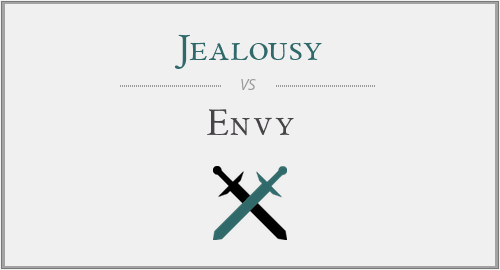At a first quick analyze, “jealousy” and “envy” seem to refer to the same thing, to the negative feeling that appears when someone else has something that one doesn’t have, but aims to own. But if we take a closer look, the words have slightly different impacts.
So even though, mainly, they might seem to define the same feeling, “jealousy” and “envy” have some subtle differences. Writers especially have to make sure they understand these subtleties before using these words, because small details matter a lot when trying to express a certain message. We’ll discuss when “jealousy” and “envy” are best to use according to the context, depending on their meanings, intensity and impact.
Jealousy vs. Envy
Both “jealousy” and “envy” are mainly used as nouns, and because both of them refer to the desire of having what someone else has, they can be somehow considered synonyms. But unlike “jealousy”, “envy” can also be used as a verb with the same meaning.
In addition to this, one of these feelings also carries the notion of anger or unhappiness, while the other is a little more aggressive. That makes it imperious, especially for writers, to understand the subtle differences between “jealousy” and “envy” in order to choose the right word to use according to the feeling they actually want to express.
When do we use “jealousy”?
In most dictionaries, “jealousy” is defined as the feeling of being “jealous”, or “jealous feelings”. So this means that “jealousy” actually refers to the unhappiness or anger that someone feels when somebody else has got something that they don’t. So the most accurate definition of “jealousy” is not actually simply craving or desiring something owned by someone else, but the actual frustration, anger or unhappiness of not having something owned by someone else. More than the wish of possession, the anger of not possessing is expressed through “jealousy”.
Example: She had an intense feeling of jealousy when she saw how happy her friends were with their marriages, unlike her. – “jealousy” refers to the unhappiness or anger felt by somebody who doesn’t have something owned by someone else.
When do we use “envy”?
As a noun, “envy” is defined as the feeling that one wishes something someone else has, but not necessarily a feeling of anger or frustration. More than unhappiness, “envy” is about the need of possession. As a verb, “envy” refers to the same thing, to wishing you had something that someone else possesses.
Example 1: He watched my new home with envy, but he knew he’ll also get one, maybe bigger and more comfortable, someday in the future. – “envy”, as a noun, refers to the feeling of desire to possess something owned by someone else.
Example 2: I envy how well they match and complete each other in their marriage. – as a verb, “envy” refers to wishing you also had something owned by someone else.
Conclusion
Even though “jealousy” and “envy” can generally be considered synonyms because they mainly refer to the same things, they should be accorded a little more attention especially by writers or people who care a lot about the deep meanings of words. It’s important you make the right choice according to the context, if you want to consider the slight subtleties that make these words different. Feel free to check the examples and explanations above whenever you are confused or doubt which one would suit better in your own context!





Have a discussion about this article with the community:
Report Comment
We're doing our best to make sure our content is useful, accurate and safe.
If by any chance you spot an inappropriate comment while navigating through our website please use this form to let us know, and we'll take care of it shortly.
Attachment
You need to be logged in to favorite.
Log In